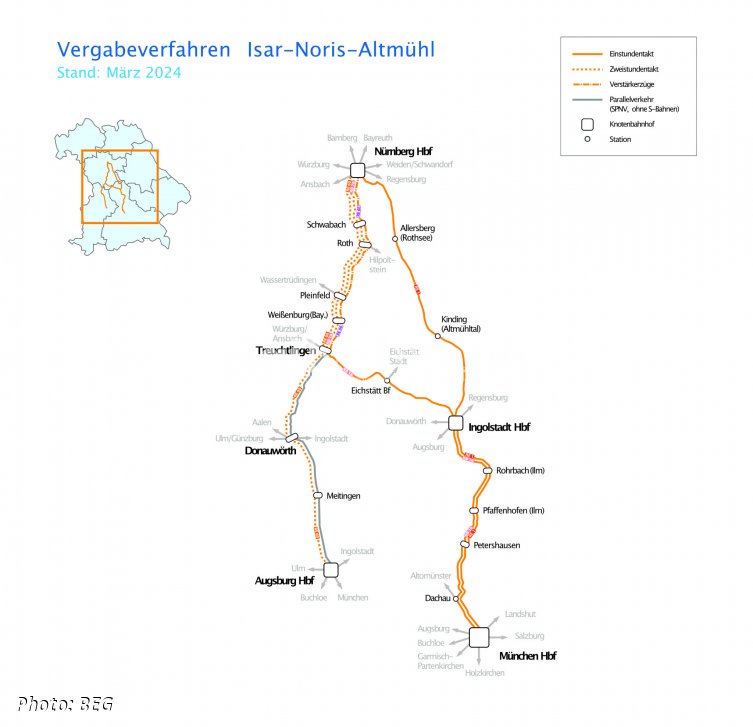München-Nürnberg-Expresses to undergo overhauls
posted on 13th Mar 2025 10:53
In November 2020, the first six-car double-deck push-pull train with Class 102 locomotive began test operation with passengers. A total of six of these trains were ordered from Škoda by DB Regio in August 2013 for the RE1 München-Nürnberg-Express (MNE) line, with an originally envisaged start date of December 2016. These trains on the 171 km-long route between the main stations in München and Nürnberg use the high-speed line via Ingolstadt.
These services, which belong to the regional transport and have a journey time between both terminals of approximately 1 h 45 min, reach a top speed of 190 km/h (their design speed is 200 km/h) and replaced the previous push-pull trains formed by Class 101 DB locomotives and single-deck IC cars, which have been running at 200 km/h since December 2006. The Škoda-built trains are located at the München-Pasing depot.
On 4 March 2025, the Škoda Group announced that it had signed a contract with DB Regio for the comprehensive overhaul of five trains, each of which has covered almost 1.5 million km. The contract also includes an option to overhaul a sixth train. This mileage corresponds to the maintenance level IS 600 (Instandhaltungsstufe), and refers to maintenance and repair of entrance doors, couplings, bogies, pantograhps, wheelsets, brakes, etc., which corresponds with the press release, which states that "work will include repairs to bogies, doors, traction converters, traction motors and wheelsets."
The work will be carried out by Škoda Pars works in Šumperk, with the first train to be delivered to in the third quarter of 2025 and the last, sixth (if the option is confirmed), in August 2028. In addition, Škoda Group will provide transport of trains to/from Šumperk, supply of long-life spare parts and other work as required.
For a considerable period of operation, the planned level of diagramming of these units has not been achieved, so instead of the pressure-tight vehicles designed to meet oncoming trains at speeds of up to 300 km/h, replacement vehicles must be used, most often the Class 445 TWINDEXX EMUs or rakes of older double-deck cars with a Class 111 locomotive. At present, only two Škoda units are being diagrammed since 7 October 2024, so since the timetable change on 15 December 2024, a train consisting of a Class 101 locomotive and six long-distance single-deck cars in DB Regio livery has also returned to the RE1 line.
In response to our questions, DB said: "In recent years, Škoda trains have not been operating on the RE1 line as planned. This was due to technical faults on the locomotives and cars, but Škoda and its subcontractors were able to successfully resolve several warranty claims. However, new defects kept appearing and there were also difficulties in purchasing materials. However, the availability of Škoda trains, and hence the München-Nürnberg-Express service, has stabilised considerably in recent months thanks to the implementation of a comprehensive package of measures. Among other things, DB has invested in expanding the infrastructure capacity at the München-Pasing depot in the form of a light shed, recruited additional staff, commissioned an additional IC single-deck rake to strengthen the fleet, optimised maintenance management systems and intensified and strengthened cooperation with Škoda.
From December 2024, RE1 again runs on weekdays according to the timetable ordered by BEG - mostly every two hours. At the weekend, trains are currently re-routed via the Altmühltal valley every four hours as an alternative and run with conventional double-deckers; all other RE1 services run as scheduled on the high-speed line at the weekend. From 7 April 2025, DB would like to return to the timetable set out in the transport contract, when all RE1 services will again run on the HSL at weekends with Škoda trains or IC trainsets."
However, a question mark hangs over the Škoda trains even after their repairs. At the beginning of March 2024, BEG (Bayerische Eisenbahngesselschaft) launched a tender for operators on the RE1 line and on other lines within the Isar-Noris-Altmühl (INA) group of services for the period from December 2028 to December 2040. The requirements for the MNE route will be pressure-tight vehicles with a maximum speed of 190 km/h, the introduction of an clockface timetable (until now, trains have been running mainly on a two-hourly clock) and, above all, a minimum of seven trainsets (to cover the hourly clockface timetable), which excludes the deployment of Czech-built units. We asked DB Regio what it plans to do with these trains after 2028. The operator answered us: "At the moment, it is still unclear whether and where the vehicles will be used from 2029."



